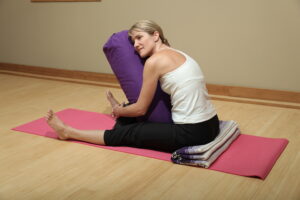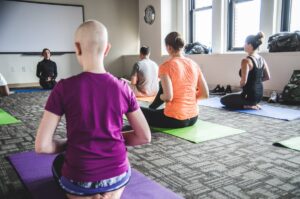Sleep is difficult for cancer patients. More than half of all cancer sufferers sleep poorly during treatment and rehabilitation, according to the US National Cancer Institute. But a new study from the University of Texas found that breast cancer patients who received chemotherapy and simultaneously practiced yoga just 2 times a week saw qualitative and quantitative improvements in sleep.
“Previous studies found yoga including https://www.julianalucky.com/post/10-top-yoga-books-for-kids to reduce sleep disorders in cancer patients, but they did not involve active control groups and did not follow-up the study participants. This study aims to fill in the gaps of the previous ones, ”said the lead author of the experiment, PhD, professor of palliative, rehabilitation and integral medicine and head of the integral medical program Lorenzo Cohen.
The importance of sleep in cancer treatment
A couple of nights without sleep will do no good to anyone, much less people undergoing cancer treatment. Lack of sleep is directly related to the weak activity of NK cells (natural killer cells that are cytotoxic against tumor cells), and they play a leading role in the functioning of our immune system.
Yoga relaxes and calms our body, thus making it easier to fall asleep and making sleep more sound. Yoga nidra and tonic yoga are especially good for these purposes.
Other methods are also suggested to promote healthy sleep. Often we sit at the computer until the moment we go to bed, and this, of course, interferes with restful sleep. It is necessary to put aside your electronic devices an hour before bed and prepare yourself in a certain way, for example, take a soothing bath, do stretching or yoga. It’s also good to go for a daytime walk while sunbathing to help you sleep at night.
But what can cancer patients actually do to improve the quality of their sleep?
Science is one thing, but life is completely different. How can cancer patients really help their bodies fall asleep?
Many cancer survivors recommend yoga. According to them, yoga is able to restore the connection between body and mind, which is often broken during treatment. Breathing exercises, flowing movements, and meditation – necessarily of a calming, relaxing type – help find this missing link. Having given up asanas, but choosing exercises for concentration, practicing pranayama and writing down their observations in a personal diary, many people note easier falling asleep and improved quality of sleep.
Another great way is to combine outdoor activities and yoga practice. However, some note that asanas are difficult for patients in the early stages of recovery from illness and may even cause physical pain. Therefore, the first thing to do before starting classes is to consult with your doctor about whether you can already start practicing yoga. If so, warn your yoga teacher that you are recovering from an illness. And then do not chase after some results, listen to your body and try to absorb all the love and positive that yoga carries.